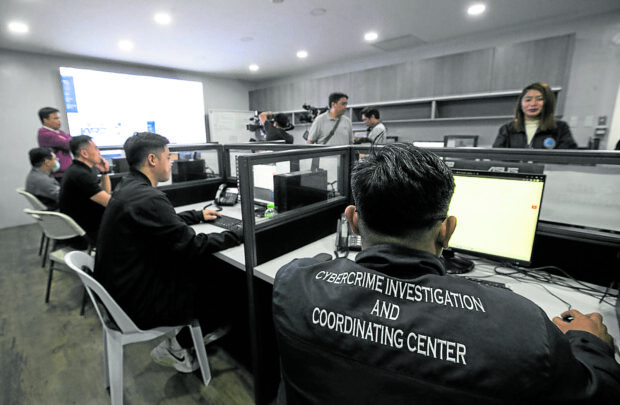Identity theft, scams via social media on the rise

CLICK WITH CAUTION | Police cybercrime investigators say most complaints are about hacked social media accounts that criminals use. (Photo by LYN RILLON / Philippine Daily Inquirer)
MANILA, Philippines — The Philippine National Police Anti-Cybercrime Group (PNP-ACG) on Thursday reminded the public to be cautious in giving personal information online, clicking suspicious website links or downloading file attachments from dubious sources after noting that cyber identity theft cases rose by 12.2 percent last year.
PNP-ACG director Maj. Gen. Sydney Hernia said in a statement that the ACG logged 1,597 cyber identity theft cases in 2023, up from 1,402 cases in 2022.
As defined in Republic Act No. 10175, or the Cybercrime Prevention Act of 2012, computer-related identity theft is the intentional acquisition, use, misuse, transfer, possession, alteration or deletion of identifying information, such as name, birthday, telephone number, credit card information of another person in order to commit fraud or other crimes.
The National Privacy Commission (NPC) also said on Thursday that individuals victimized by identity theft could file a complaint at their office, providing another official channel where victims of such crimes could seek help from the government.
“The complaints and investigation division will evaluate the complaint and ask for evidence as needed,” Roren Marie Chin, chief at the NPC’s public information and assistance division, said in a message sent to the Inquirer.
Article continues after this advertisement“Currently, our commission has received only inquiries pertaining to stolen IDs and identity theft. There has not been any formal complaint submitted to date,” she added.
‘Love scam’
Scammers have found a way to shift to social media after the SIM (subscriber identity module) registration law was implemented, according to Col. Jay Guillermo, the PNP-ACG cyber response unit chief.
But despite the increase of cyber identity theft cases, he said the numbers were not alarming.
“Roughly, we have 88 million social media users and with the increase of over 200 (cases), it’s not so alarming,” he said at a press briefing on Thursday.
Guillermo said social media users should regularly update passwords on all their online accounts to make it difficult to crack for hackers.
He also warned the public about a scheme called “love scam” wherein criminals use fake accounts to build relationships with vulnerable social media users. These scammers later ask for money or ask their victims to invest in cryptocurrency.
In October last year, the PNP-ACG reported the arrest of two suspects involved in a “love scam.”
It said the case stemmed from a complaint filed by a 72-year-old widow from Batangas City who had fallen victim to a fraudulent online relationship that left her emotionally and financially devastated.
According to the police, the woman encountered on Facebook a person named “Evans Maxwell,” a supposedly American national who seemed genuinely interested in her.
Over time, the PNP-ACG said the impersonator skillfully manipulated her trust and affection, persuading her to send a total of P1.9 million for alleged travel documentation—a manager’s check worth P700,000 to an individual named “Louie John Petere” and another P1.2 million through a money remittance service to “Laiden Petere,” following the instructions of her online companion.
But when her “boyfriend,” whom she had never met in person, asked for an additional $20,000, the PNP-ACG said the widow finally realized she had fallen prey to a “love scam.”
Seeking assistance from the police, the PNP said the suspects were apprehended in an entrapment operation in Las Piñas City.
Scammers spare no one
Various government agencies have been warning the public to be wary of cyberscams that come in many forms and have been around for years.
As far back as 2016, the PNP-ACG said it arrested in Quezon City a female college student for “identity theft” after posing as either celebrity Maricel Laxa-Pangilinan or her children to extort money from the Pangilinan family’s friends and supporters.
It said the suspect created fake Facebook accounts using the names, pictures, and personal circumstances of Laxa-Pangilinan and her four children.
Using the individual fake accounts of Laxa-Pangilinan and her children, the police said the suspect communicated with friends and relatives of the celebrity endorser and asked them to donate money for her outreach program.
There was also the case of two male suspects arrested by the PNP-ACG in July 2022 for pretending and using the identities of the legitimate winners in former Gov. Luis “Chavit” Singson’s promotion on his Facebook account wherein he gave away P1 million in cash to 200 individuals or P5,000 for each winner and 24 pairs of Air Jordan sneakers through an online raffle as he celebrated his 81st birthday on June 21.
Even police officials have been targeted by scammers. In July 2022, the PNP-ACG reported an incident of identity theft involving the creation of a Facebook account bearing the profile of Police Lt. Gen. Vicente Danao Jr.
The PNP-ACG said it arrested three suspects who used the fake Facebook account of the police official to defraud a complainant who was promised a thousand sacks of rice purportedly as part of Danao’s Police Community Relations activities.
Based on their conversation online, the PNP-ACG said the complainant was asked by the suspects to pay P50,000 as shipment fee for the delivery of the sacks of rice, prompting the former to be suspicious and report the matter to the police.